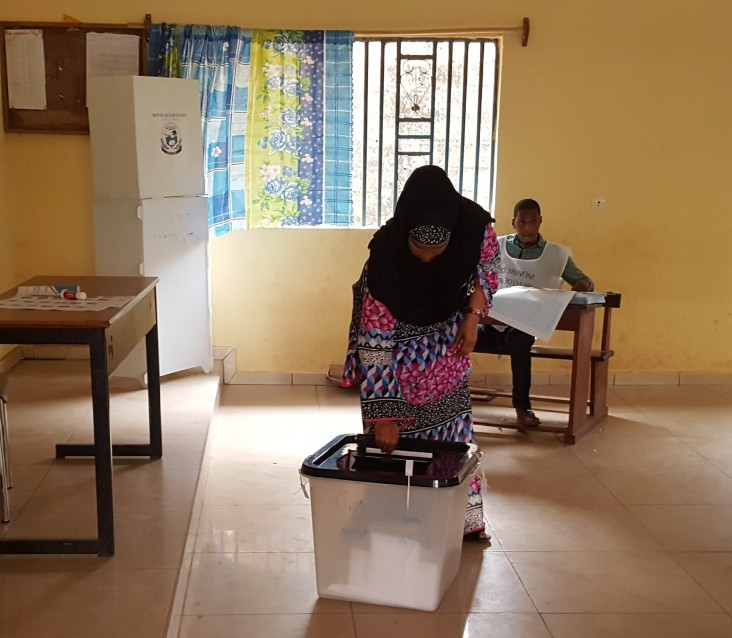Speeches Shim

Guinea started in its path of democratic transition by swearing in its first freely elected president in December 2010. This was followed by legislative elections in September 2013. To sustain these democratic gains and ensure a more credible and accountable rounds of elections (presidential in 2015 and local in 2018), USAID launched an activity aimed at reinforcing the capacity of Guinea’s election stakeholders such as the Independent National Electoral Commission (CENI) and empowering civil society organizations to effectively conduct domestic election observation and monitoring. In addition, with USAID assistance, Search for Common Ground targeted conflict mitigation not only during presidential and local elections but also during the Ebola crisis by delivering key messages and accurate news reporting to rebuild trust within communities and public health facilities.
Building Electoral and Accountability Capacities, Orderly Norms, and Democratic Governance (BEACON-DG)
Over the past four years, the Consortium for Elections and Political Process Strengthening (CEPPS) has promoted dialogue and consensus building, strengthened capacity and structure of political parties, expanded civic and voter education, enhanced citizen engagement and provided oversight of electoral systems and strengthened the electoral administration in Guinea. USAID investments included the training of 15,980 political party members, 320 domestic election observers (who were deployed across the country) and 9,025 election officials (who built crucial election capacities of both public institutions and civil society).
Presidential and local elections successfully took place in 2015 and 2018, respectively. Inter-party dialogues and consensus building forums supported by USAID, in particular, proved crucial for rebuilding the needed political will and momentum to hold the local election in February 2018 (after years of delays), and then to drive multi-stakeholder consultations in June-November 2018 for recommended draft reforms to the election law.
Despite this overall progress, significant challenges remain across the country. Political will for reforms or even for basic adherence to the rule of law remains very low. The political environment remains highly polarized. Significant changes in the makeup of key institutions like the electoral commission have taken place, resulting in capacity gaps that need to be addressed. The upcoming 2019 legislative and 2020 presidential elections will pose additional risks that need to be monitored going forward. These elections are critical for consolidating its democratic transition as well as peace and stability both in Guinea and in the sub region. BEACON-DG will serve as the logical follow-on activity to the “Support Legislative and Presidential Elections” activity (CEPPS/Guinea) that performed effectively as the USAID/Guinea’s flagship elections strengthening program since 2015. The purpose of BEACON-DG is to strengthen Guinea electoral processes through increased accountability of the electoral system.
Cultural Cohesion for Peace and Prosperity Project (C2P2)
USAID's Cultural Cohesion for Peace and Prosperity project (C2P2) supports Guinea’s civil society to strengthen social cohesion within and across ethnic groups by engaging opinion leaders in promoting tolerance and fostering women’s contribution to political reconciliation and peaceful coexistences USAID Conflict Mitigation and Management interventions will specifically target the use of traditional conflict resolution mechanisms and increase access and role of the media, develop peace building messages during elections and foster collaboration among local elected leaders, authorities and opinion leaders to identify conflict triggers.
Citizens' Involvement in Health Governance (CIHG)
Improve citizens’ understanding of and participation in Guinea’s health system reforms, and in the process, build public trust in Guinea’s health sector and governance. This will be achieved through expanding opportunities for elected and appointed officials and citizens to engage in constructive dialogue and improving the quality of public discussion on health issues.
Internal Debt Management
Guinea has made dramatic improvements in macroeconomic governance and public financial management since the transition to democratic rule in December 2010. As a result, the nation was formally approved for billions of dollars in debt relief under the World Bank’ Highly Indebted Poor Country program. USAID is currently supporting these important efforts to increase fiscal transparency by collaborating with the US Treasury to provide internal debt issuance and management advisory services to the Government of Guinea. The activity will focus on helping Ministry officials manage their internal debt and revenue more strategically. Specific areas of focus will be to continue improving tracking and planning of internal debt, development of new, longer term local currency debt instruments and helping establish an interbank lending facility; for revenue management, the goal will be to put in place procedures and policies that ensure prompt and reliable collections.


Comment
Make a general inquiry or suggest an improvement.